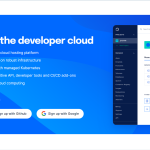Introduction
As we step into 2024, the concern around The Future of Mobile App Development: and AI-driven innovations is growing louder.
It’s considered a big deal in our lives. We all use apps daily, but there’s a problem: there are so many apps out there! How do new apps stand out?
The cool answer is Artificial Intelligence (AI). AI is like adding a turbo boost to apps, making them smarter and more fun to use.
In this article, you’re in for an exciting ride. We will talk about how AI is changing the game in app development.
You’ll understand that AI is more than just a trendy word in tech by the end of this piece. It can help make our apps more fun, useful, and personal. Get ready for a cool look into the future of apps!
Growing Demand For Mobile App Development
In the present time, mobile apps are reigning in the business world in a way that the revenue earned is skyrocketing with each passing day. As we move into 2024, the demand for mobile apps will be driven by several key trends and technological advancements.
One of the large indicators is that the rate of new app additions on the Google Play Store has seen a substantial increase. In the first quarter of 2022, there were over 2.75 million Android apps in the Google Play Store, with about 3,639 new mobile apps added daily.
A lot of different businesses are pushing this growth, but gaming had the biggest share of income in 2022. Music and entertainment apps are also seeing a lot of growth in use.
Mobile apps are enjoying the digitization phase, due to which communication has become fast-paced and simpler.
Another reason the mobile app development business has gained momentum is that the eCommerce business has become more gigantic.
The popularity of sites like eBay, Amazon, and Flipkart is a live example.
More and more sophisticated mobile devices are flooding the market, which means that developers are cranking out new apps at an impressive rate.
These days, people are quite knowledgeable, so when they download an app, they always prioritize its features.
Impact Of Artificial Intelligence On Mobile Apps
Incorporating AI into mobile apps can produce many benefits, including fast and convenient for users, app special features; and boosting personalized interactions.
1. The Better matching search result.
Search engine algorithms are constantly evolving and becoming more complex. Voice interactions and NLP make it easier for apps to tailor experiences to each user by using data about their likes, dislikes, actions, and the situation they are in. They are capable of providing relevant searches and recommendations.
A system of AI-driven mobile applications will make it easy for users to get results that are both relevant and accurate. The majority of customers (91%) are willing to purchase from businesses that cater to their tastes, according to research.
2. Better app performance.
Machine learning is a part of AI and it greatly helps in optimizing the performance of mobile applications.
For example, AI improves credit scores, risk assessment, and fraud discovery by analyzing large amounts of data in more complex ways. This makes sure that strong security measures protect user funds.
AI works to make things easier for everyone, not just people in the banking industry. Language translation, material summarization, and knowledge of context are all possible with NLP systems.
3. Virtual Assistants and Enhanced Interactions
AI in mobile applications supports speech and image recognition. This not only caters to the needs of modern users but also sets new standards in user experience.
The broad adoption of virtual assistants is a direct result of the incorporation of AI into mobile app development.
Thanks to their superior natural language processing skills, these assistants can comprehend and anticipate human behaviour with remarkable accuracy, allowing them to provide intelligent and personalized service.
How far does AI go in its innovative ways?
Within the mobile app development landscape, AI can support upgraded features like predictive analytics, voice interfaces, language translation, etc.
1. Deep Learning.
With deep learning models, artificial intelligence applications have reached a whole new level of complexity.
The neural networks in these models are designed to imitate those in the human brain. As a result, they can analyze data very well and provide insights that are used to build smart and responsive app features. This feature can give users some personalized analysis and make predictive recommendations.
2. Natural Language Processing.
NLP-powered AI will enable apps to understand and respond to natural language queries. Conversational interfaces will become prevalent, enabling users to interact with applications through natural language conversations and voice commands.
The popularity of voice-activated apps has increased with the craze of leading tech firms like Siri, Google Assistant, and Alexa. Now you can use your voice to do simple things like send messages, create reminders, or search for information.
3. Open AI
OpenAI models like ChatGPT are changing how we use technology. ChatGPT’s capacity to interpret and create human-like text makes mobile applications more intuitive and entertaining.
Its integration might make app interactions more conversational and tailored. This model can learn from a huge amount of data thanks to its deep learning features.
This makes it not only very quick but also very adaptable to user tastes and situations. By using ChatGPT, mobile apps can offer highly personalized and context-aware conversations, which makes users much more interested and satisfied.
4. AR and VR integration
Augmented Reality (AR) and Virtual Reality (VR) hold tremendous potential to transform multiple industries. Both AR and VR are powerful technologies that take user experiences to new levels.
In 2024, we anticipate more sophisticated AR applications that seamlessly blend virtual and physical worlds, providing users with enriched and interactive experiences.
This integration will revolutionize virtual shopping, mobile gaming, architectural visualization, and other domains, pushing boundaries further. AI helps to enhance user experiences and personalization like never before!
Ethical Considerations of AI in App Development
The future of AI in mobile app development rests in hyper-personalization and context awareness.
1. Ethical Concerns
As AI is used more and more in mobile apps, ethics questions start to come up. Concerns like data protection, artificial bias, and the proper use of AI technologies need to be looked at to make sure that progress in mobile app development is in line with morals and user trust.
With the increasing integration of AI, mobile app developers are focusing on enhancing security measures. AI solutions already detect shadow data and alert professionals on endangered assets. They are also beginning to fix issues for the user rather than just prompting an accurate remedy.
Benefits of AI integration
Better security and fraud detection: AI in mobile apps has made security better, especially for apps that deal with private data.
It lets you watch what users do and how the system responds in real-time so you can spot strange behaviour. This makes it easier to spot scams and makes the app safer overall.
- Advanced Decision-Making: AI helps people make choices by looking at user behaviour and interests. This can help with designing apps, adding new features, and coming up with marketing plans.
- Better App Performance and Efficiency: AI improves the performance and efficiency of mobile apps by keeping an eye on their functions in real-time, finding problems, and making the best use of user interactions.
- New business chances: AI creates new business chances by spotting trends, making it possible to create new apps, and making advertising models smarter.
- Integration with IoT and Smart Devices: AI makes it easier for mobile apps to work with IoT and smart devices, which opens up more features and functions for mobile apps.
- Smart Personalization and Recommendation Systems: AI makes smart personalization possible in mobile apps, which tailors user experiences to their unique likes and dislikes and how they act. In turn, this makes users happier and more interested.
- Advanced Data Analysis and Insights: AI’s data analysis skills give us information about things like user behaviour, app success, market trends, and more, which we can use to make decisions about our strategy.
- Increased Innovation: AI supports new ideas in mobile app development, which makes it possible to make complex, engaging, and easy-to-use apps.
Final Thought
As long as developers keep looking into all the different ways this agreement can be used, users will be able to use mobile apps that not only meet their needs but also go above and beyond them.
Undeniably, artificial intelligence intertwines the future of mobile app development. In conclusion, artificial intelligence (AI) will lead the way in the mobile app development industry’s exciting future.
So, with the assistance of the top app development firm, dive headfirst into the AI-driven future of mobile app creation.





GIPHY App Key not set. Please check settings